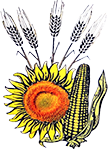New Varieties of Alfalfa Created at NARDI Fundulea
Maria Schitea1, Elena Petcu1, Lenuţa Drăgan1, Mihaela Popa1, Mihaela Ciora2
1National Agricultural Research and Development Institute Fundulea
2Institutul de Stat pentru Testarea și Ȋnregistrarea Soiurilor Bucureşti
Keywords: alfalfa, synthetic cultivars, forage, seed, yield, fodder quality, adaptability.
Abstract: In alfalfa, the increase in production and quality leads to an increased amount of useful substances per unit area as well as an increase in the amount of residual nitrogen made available to the postmergent plant, between there is a very close positive correlation.
Constantina and Nicoleta varieties are the result of alfalfa breeding activity in order to create genotypes with improved quality, simultaneously with a high production capacity and good adaptability to biotic and abiotic environmental conditions, in the context of climate change.
Depending on the level of water supply and the year of cultivation, the two new varieties achieved yields between 5.0 and 18 t/ha dry matter at Fundulea and 5.8-32.0 t/ha in the SIVTR network, exceeding the controls, with production increases of up to 10%. The average increase was 6.0%, proving a very good water recovery capacity.
Constantina and Nicoleta varieties offer a very good quality fodder, they have a higher protein content than the control varieties by 0.6-0.7%, this being around 22% in sprouts compared to 21.2% for the control variety, Catinca.
The seed production capacity of Constantina and Nicoleta is higher with 3-7% than the control Catinca, which will allow their multiplication and rapid introduction into the culture.
This paper presents the results obtained in the project: PN 19-25.02.01, entitled ,,Increasing the degree of protein assurance by creating varieties of annual legumes (peas and soybeans) and perennial legumes (alfalfa) with performance, agronomic and quality competitive in the context of climate change” in the 19-25 Core Program, funded by the Ministry of Research, Innovation and Digitalization, in the period 2019-2022. The alfalfa breeding program conducted at the NARDI Fundulea aims to create varieties with high production capacity for fodder and seed, with quality, respectively, high nutritional value and with good adaptability to the conditions of biotic and abiotic environment.
